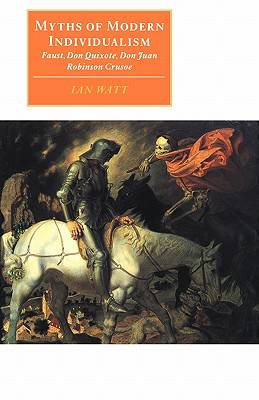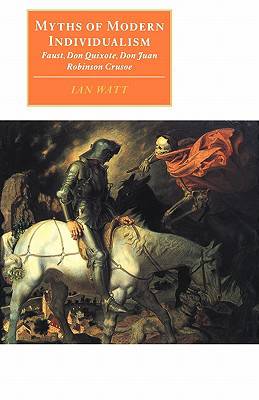
- Afhalen na 1 uur in een winkel met voorraad
- Gratis thuislevering in België vanaf € 30
- Ruim aanbod met 7 miljoen producten
- Afhalen na 1 uur in een winkel met voorraad
- Gratis thuislevering in België vanaf € 30
- Ruim aanbod met 7 miljoen producten
Zoeken
€ 50,45
+ 100 punten
Uitvoering
Omschrijving
In Myths of Modern Individualism, the renowned critic Ian Watt treats Don Juan, Don Quixote, Faust, and Robinson Crusoe as "individualists," pursuing their own views of what they should be. The original Counter Reformation myths saw the individualism of Don Juan, Don Quixote, and Faust as a problem to be quelled by death or mockery. However, the Romantic period, a time more favorably disposed toward myth, saw their dissension not as unacceptable disorder, but rather as admirable and heroic behavior. This incisive study traces attitudes toward these figures and the Romantic product Robinson Crusoe from disapproval to awe to skepticism, examining them as icons of such problems as solitude, narcissism, and the claims of the self versus the claims of the community. Pointedly, none of these figures marries or has a lasting relationship, save for the selfless devotion of a single male servant. Watt argues that the myths of Don Juan, Don Quixote, Faust, and Robinson Crusoe remain the distinctive products of Western society, embodying the most basic values of modern culture.
Specificaties
Betrokkenen
- Auteur(s):
- Uitgeverij:
Inhoud
- Aantal bladzijden:
- 312
- Taal:
- Engels
- Reeks:
Eigenschappen
- Productcode (EAN):
- 9780521585644
- Verschijningsdatum:
- 13/02/1997
- Uitvoering:
- Paperback
- Formaat:
- Trade paperback (VS)
- Afmetingen:
- 137 mm x 215 mm
- Gewicht:
- 344 g

Alleen bij Standaard Boekhandel
+ 100 punten op je klantenkaart van Standaard Boekhandel
Beoordelingen
We publiceren alleen reviews die voldoen aan de voorwaarden voor reviews. Bekijk onze voorwaarden voor reviews.











